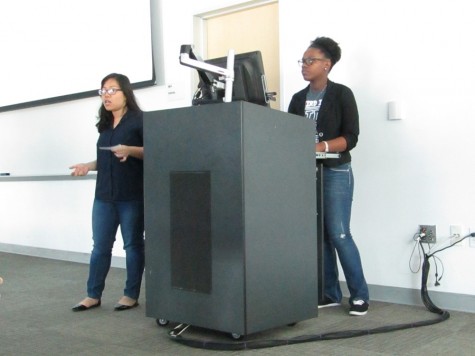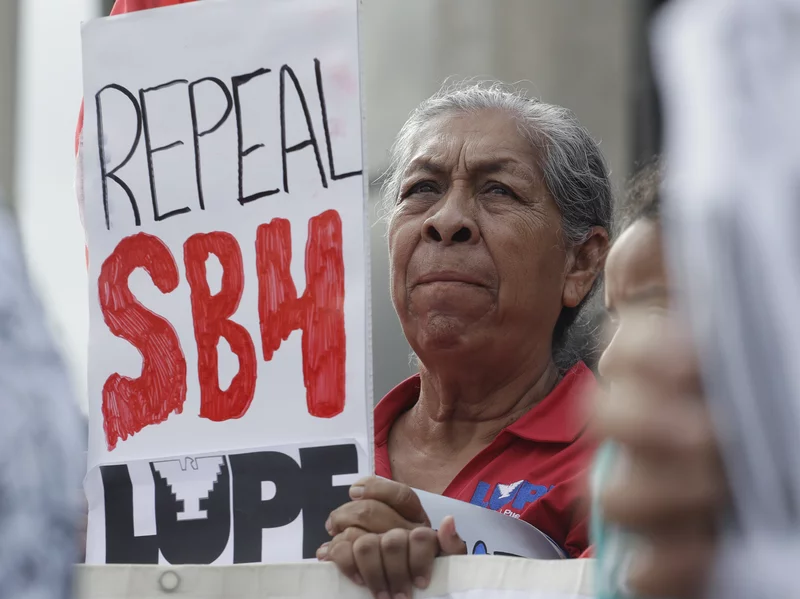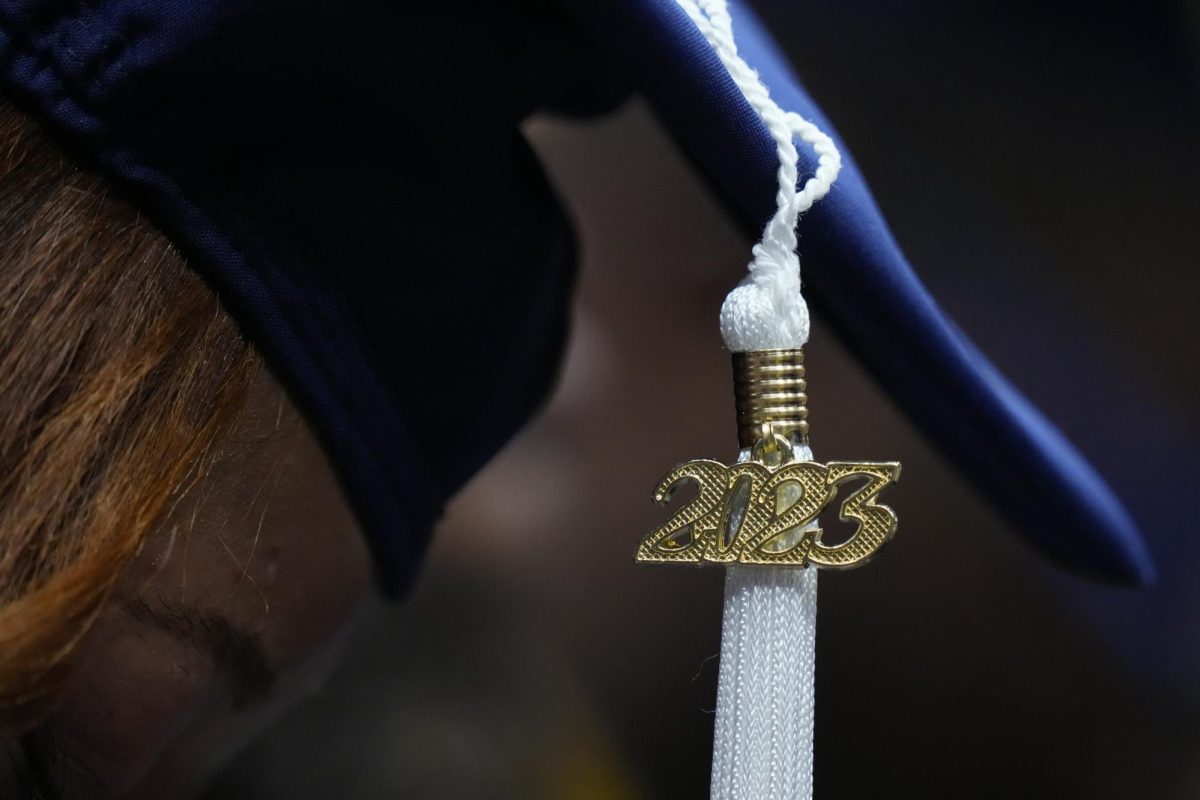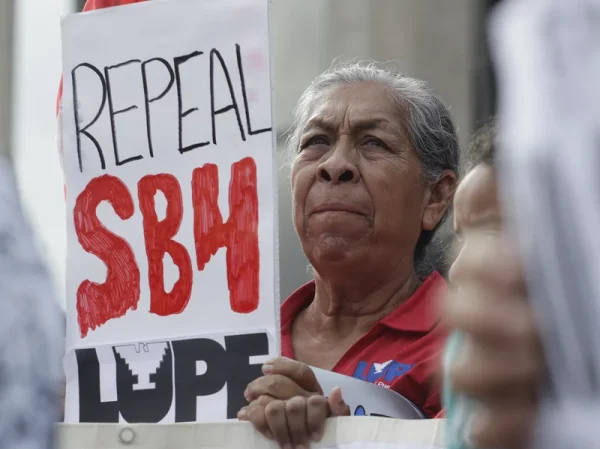Textbooks outrageous prices: Students request affordable options
April 3, 2016
“The price of textbooks is out of control,” stated HCC student Jessica White to instructors at a Faculty Senate meeting.
According to the College Board, the average cost of books and supplies for a student at a public two-year college is $1,364 for the 2015-2016 school year. That’s more than what an in-district HCC student taking 15 credit hours paid in tuition this spring.

Central Student Library Advisory Council Secretary Thao Nguyen (left) and Treasurer Jessica White (right) address the Faculty Senate meeting on March 11 to ask instructors to use free, open sourced textbooks like OpenStaxs.
“For many students and families who are already struggling to pay tuition, this out-of-pocket expense can be a huge burden,” added White, who is the treasurer of the Central Student Library Advisory Council.
The student group asked faculty to pledge to using free, open source materials at the Faculty Senate meeting on March 11.
Seven Houston Community College instructors pledge to adopt these free textbooks. Another ten faculty members endorsed the open source initiative and committed to finding out more about Open Educational Resources.
The students asked faculty to sign a pledge to commit to at least one of the following: “use open educational resources that provide access to quality, free, digital textbooks that are offered under an open license that allows free digital access and low-cost printing”; “refuse to adopt commercially published textbooks”; or commit to learning more about about open resources before making a decision.
This is just the start of the students’ push for affordable textbooks, but in many ways the open source movement has already started at HCC.
Open Educational Resources include any type of educational materials that are in the public domain, introduced with an open license, or otherwise not subjected to strict copyright laws. Anyone can legally and freely copy, use, adapt and re-share them.
One organization which produces open-sourced educational materials is OpenStax, an initiative of Rice University. OpenStax provides free online PDF copies of textbooks on subjects ranging from Algebra to Microeconomics.
The SLAC team compared the table of contents of White’s commercial sociology textbook with an OpenStax textbook, they were almost identical. “The only difference is one is free and one is $92,” noted Central SLAC Secretary Thao Nguyen in an interview.
In addition to the free PDF copies, OpenStax also prints “traditional textbooks available for as low as $20. Through our site you can also customize the book covers,” explained Daniel Williamson, the Managing Director of OpenStax, at the SXSWedu conference.
For a student taking five classes in the fall and spring, their textbook bill would be as low and $200 if all their professors used OpenStax textbooks and the student wanted physical copies,and completely free for online content compared to the current national average of about $1,300.
The late HCC Professor Kenneth Busbee developed an open-source Programming Fundamentals C++ textbook in January 2013, which is still available at the OpenStax website (bit.ly/1UtUMJm) and on his HCC Learning Web page.
Some psychology instructors have already adopted an open textbook in their classes.
Dr. Huong Ho uses an Introduction to Psychology textbook in her online classes, which students can download from her Learning Web page for free. Eleven HCC psychology faculty members including Ho adapted the textbook and made an HCC edition back in May 2013.
Ho said in an interview that she uses the open textbook “because it’s free for the students, and you get the learning out there.”
Ho recalls that at the beginning of the semester, students would tell her that they couldn’t complete their assignments because the campus bookstore was sold out, or that they had the wrong edition, or that they simply couldn’t afford their textbook yet.
Now, Ho says, “All of those are negated because, guess what? It’s now here online. Just click on this link and there you go. You just focus on learning.”
When textbooks are literally unaffordable, students simply go without. More than half of students in a 2014 Student Public Interest Research Group study said they have gone without an assigned textbook because it was too expensive.
Students realize not getting the textbook is risky; the survey also found that over 90 percent of students who had foregone purchasing a textbook were concerned that doing so would hurt their grade.
In an Egalitarian online reader poll, 71 percent of respondents said that they had gone without a required textbook because it was too expensive.
Last fall, the Central campus Student Library Advisory Council teamed up with the Student Government Association to start a textbook lending library “by the students, for the students.”
With the collection, students can check out textbooks for the entire semester. Their growing collection now includes about 225 textbooks, over 170 of which have been checked out. They calculate the program has saved HCC students over $8,500 so far.
“We realized that we cannot help all of them,” explained Nguyen in an interview, so they started searching for a better solution
“We can collect textbooks all day long, we’ll never collect enough to meet the demand,” added Central SLAC Adviser Erica Hubbard, who called the open source option “the most sustainable solution.”
Another issue was that while students could get a textbook from the library through the lending program, they would have to purchase the online access code separately.
Nguyen told faculty, “I had to buy my calculus textbook, which costs me $305, which I can use for three classes from Cal I to Cal III. However, for every semester, I have to buy a copy of the new [homework website] access code, which costs me $120 every semester, just to do my math homework.”
My the time students like Nguyen complete their calculus course series, they have spent $665 on course materials, which is more than an in-district HCC student pays in tuition for those courses.
“If you have two roommates who are taking the same course, and are able to share the same textbook, if you have online assignments, they cannot share the same online number,” added a Faculty Senate member. One student would have to purchase another access code for the homework site, which often costs almost as much as the textbook. “It’s horrible because you can’t even save money with two people in the same household reading the same book.”
Lumen Learning found that using open instead of commercial textbooks improves the rate of students earning a C or better by about four percent in some courses. If students earn anything below a C in a class that course credit will not transfer.
Currently, the “wildly important goal” of Dr. Kimberly Beatty, HCC’s Vice Chancellor of Student Services, is to raise student success rates of earning a C or better by about two percent by May 2017. College-wide adoption of free, open source textbooks could help accomplish this goal.























